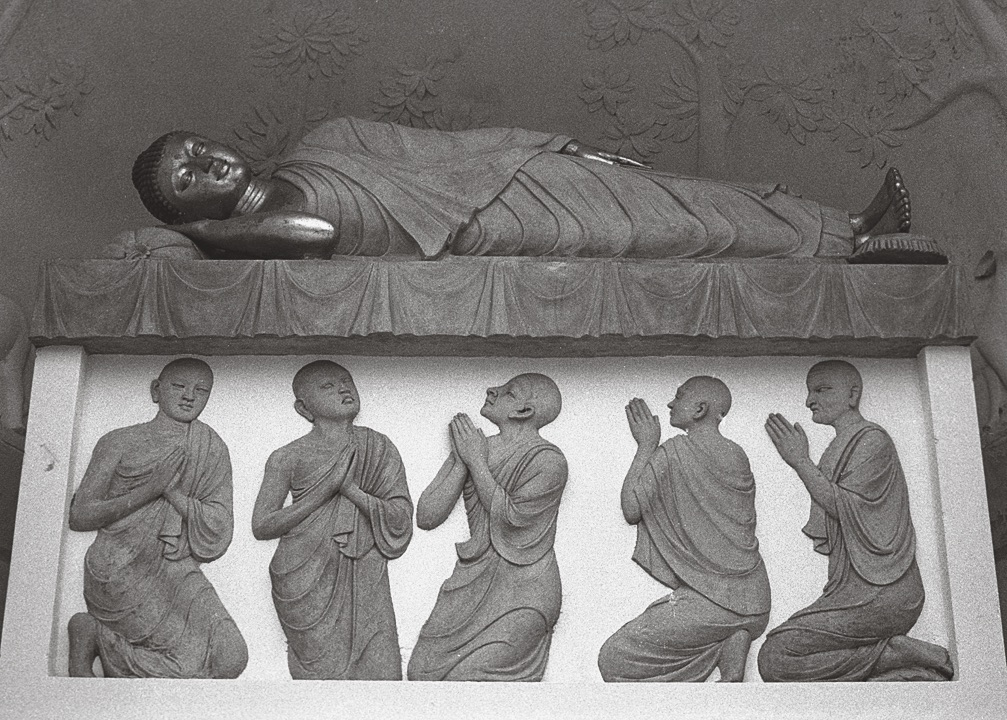In 1982, I was one of a small group of Zen students who were invited to an audience with Nichidatsu Fujii. Guruji, as he was affectionately known, was making a short visit to Los Angeles on his way back to Japan following that spring’s historic nuclear disarmament activities in New York, which he and his order had devoted themselves to for at least a year prior to the actual events. He had given a twohour lecture in a house in South Central, sitting in a chair by the front window of a large living room packed mainly with what might well have been the greater part of all the Nipponzan Myohoji monks and nuns in the world. At the conclusion of the lecture, one of the monks, apparently sent by Guruji from an adjoining room where he was resting, asked if we would like to meet him. We said we would of course be honored but, as he had obviously begun to weaken toward the end of the talk, we didn’t want to impose. The monk told us, in the best English he could muster, that Guruji wanted to meet us and would be disappointed if we declined the invitation. So that was that.
He was at the time ninety-eight years old, I believe. The coughing spells that had started near the end of the lecture made it hard for him to speak, but they did not deter him. Whenever a fit would make it impossible to go on, he would reach out and one of the monks would hand him a small medicine bottle, and he would take a swig of the remedy it contained and continue. It was clear that the weeks of travel, walking, chanting, lecturing, and so forth had left him depleted of normal energy, but something else— some mix of iron will and numinous force—kept him going, held him together, in fact.
Over the years, it had for some reason been my good fortune to have met some of Buddhism’s most revered teachers, meditation masters from Zen, Tibetan, and Theravada lineages. But I had never, nor have I since, been as riveted, as moved, or as just plain gobsmacked as I was by Nichidatsu Fujii. It was certainly not a matter of the content of what he said. Indeed, I found his dharma teaching so literalistic and parochial as to be quite ill-suited for contemporary life, at least, I thought, for all but a relatively small number of ardent disciples. His presence was the thing. The Lotus Sutra, the daimoku, the teachings of Nichiren, and all the virtues they carry—one sensed they had penetrated to the marrow of his bones, into his very molecules. And when, as we were about to leave, he picked up a drum and with a few wan strikes and in a hoarse whisper chanted Namu-myoho-renge-kyo several times, I had the feeling we were as much in the world of the Lotus Sutra as in Los Angeles, that he had, in those few moments, evoked the wholeness of that world in and as our sad and suffering saha city of angels.
I’ve never thought the way of Nichidatsu Fujii would have much direct bearing on my own life. But scarcely a week goes by when I don’t think of him. And for those who do follow his way, I feel only glad and grateful that, through the selflessness of their practice, the Lotus Sutra is made a living presence in our world. My life is so very different from theirs, yet in some way I can’t quite put a finger on, I feel a deep kinship with them. I suppose it’s just one of those “there are more things in heaven and earth than are dreamt of in your philosophy” type things.
Thank you for subscribing to Tricycle! As a nonprofit, we depend on readers like you to keep Buddhist teachings and practices widely available.
